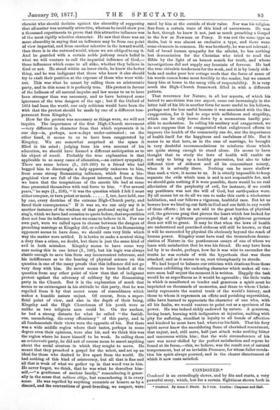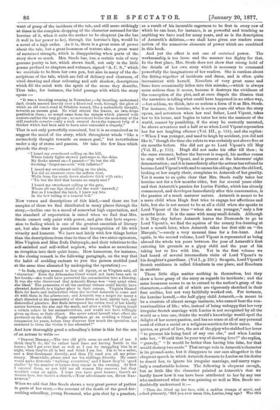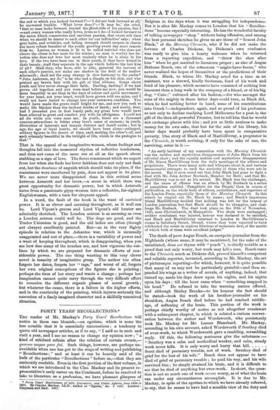CONDONED* Condoned is an exceedingly clever, and by fits and
starts, a very powerful story, which, but for a certain flightiness shown both in
* Condoned. By Anna C. Steele. In S vols. London : Chapman and Hall.
want of grasp of the incidents of the tale, and still more strikingly at times in the complete dropping of the character assumed for the heroine of it, when it suits the author to be eloquent (as she has it well in her power to be), through the heroine's lips, would be a novel of a high order. As it is, there is a great sense of power -about the tale, but a great looseness of texture also, a great want of sustained strength, which is disappointing when parts of the story show so much. Mrs. Steele has, too, a certain vein of very genuine poetry in her, which shows itself, not only in the little poems prefixed to chapters and volumes, signed "A. C. S.," which we conclude to be from her own pen, but also in many of the de- scriptions of the tale, which are full of delicacy and clearness, of vivid drawing and clear colouring and soft shadow, descriptions which fill the mind with the spirit of the scene they describe.
Thus take, for instance, the brief passage with which the story -opens :—
" It was a brooding evening in November ;—by brooding, understand dark clouds massed heavily over a blood-red west, through the glow of which an old coach-road in Siltshire wound, like a melancholy thought, towards an unseen goal. No wind stirred the leaves, no rain-drops prattled in them; no sound *fame from the steeple which pierced with austere outline the rosy gloom ; no movement broke the monotony of the still roadside coverts—only a rook swayed down the topmost twig of a thicket which had been said to have once concealed a tragedy."
That is not only powerfully conceived, but it is so conceived as to suggest the mood of the story, which throughout winds "like a melancholy thought towards an unseen goal," but nevertheless ender a sky of storm and passion. Or take the few lines which precede the story :—
" I heard my sweetheart calling on the hill, Where lonely lights showed pathways to the skies. My flocks moved on—I paused—"tie but the rill Soothing forget-me-nots ' with lullabies!'
I heard my sweetheart calling on the plain, Yet did no creature cross the saffron west, While from the north drove shadows thick with rain ; "Tis but the bird that haunts an empty nest !'
I beard my sweetheart calling at the gate, Where oft our lips closed o'er the word farewell ;' But as I touched the latch, I knew my fate In the low tolling of a funeral bell."
Now verses and descriptions of this kind,—and these are but samples of those we find distributed in many places through the story, incline one to a mood of somewhat high expectation, and the standard of expectation is raised when we find that Mrs. Steele cannot only paint with power, and give that lyric expres- sion to feeling which is one of the greatest essentials of literary art, but also draw the paradoxes and incongruities of life with vivacity and humour. We have met lately with few things better than the descriptions from time to time of the two sister-spin eters, Miss Virginia and Miss Rufa Dalrymple, and their relations to the self-satisfied and self-willed nephew, who makes so unwelcome an irruption into their quiet home. How humorous, for instance, is the closing remark in the following paragraph, on the way that the habit of scolding endears to you the person scolded (and at the same time alienated by undergoing the operation) :— " In Rata, religion seemed to lose all rigour, or as Virginia said, all character.' Even the Athanasian Creed would not have been safe in her hands,—she would have perverted the commination into a blessing. It was she who discovered that Astaroth Herne was ' very quiet when she liked.' The possession of all the cardinal virtues could hardly have elevated Astaroth to a higher place in their esteem. Virginia blamed Rufa for haste and indiscretion when she invited Astaroth to come and sit with them in the afternoons ; and Astaroth was a target for many a shaft directed at the immorality of shoes down at heel, untidy hair, and dishevelled pinafore. But Hula interposed the cotton wool of her kindly nature between the aim and the mark, and after a while Virginia found a certain solace in her animadversions, and would not have willingly given up them or their object. She never asked herself what effect she produced on the child. People sometimes go on scolding a friend or companion for years, before they discover how much the operation has endeared to them the victim it has alienated!"
And how thoroughly good a schoolboy's letter is this for the son of an actress to write :—
"Dearest Mammy,—The two old girls seem no end fond of me. I think they'll do, tho' its rather hard lines not having Nettle in the house ; but I get over that as well as I can by smuggling him in at night, when they're all in bed and think I am too. I'm to be a sailor, and a first-lieutenant directly, and then I'll send you all my prize- money. Meanwhile, please send me ten shillings directly. My aunts would make first-rate ' walking eccentrics,' and I know they're 'good studies' by the number of hymns they repeat in the evening. At first I encored them, as you told me all women like encores ; but they wouldn't come on again. I hope you have good houses; there's no theatre here, but there's a ohurch.—Your affectionate son, Huam DAL- RYMPLE."
When we add that Mrs Steele shows a very great power of pathos an parts of her story,—the account of the death of the good-for- nothing schoolboy, young Desmond, who gets shot by a poacher, as a result of his incurable eagerness to be first in every row of which he can hear, for instance, is as powerful and touching as anything we have read for many years, and so is the description of Astaroth's delirium,—we shall have given our readers some notion of the numerous elements of power which are combined in this book.
And yet the effect is not one of sustained power. The workmanship is too loose and the manner too flighty for that. In the first place, Mrs. Steele does not show that strong hold of the details of her own story which is necessary to command powerfully the imaginations of her readers. She is careless about the fitting-together of incidents and dates, and is often quite inconsistent with herself. Novelists of very great name and fame have occasionally fallen into this mistake,—which is always more serious than it seems, because it destroys the vividness of the conception of the plot, and at once dispels the illusion that the narrative is telling what could have happened in no other way, —but seldom, we think, into so serious a form of it as Mrs. Steele. For instance, the heroine, who is seven years old when the story opens, and seventeen when her real father, Lord Vipont, takes her to his house, and begins to tutor her into the manners of the world, cannot by possibility, if the story be correctly narrated, be above seventeen and a half or so when Lord Vipont reproaches her for not laughing oftener (Vol. III., p. 124), and she replies: " When I was younger, and used to laugh by accident, you did not like it," though the time she refers to was certainly not above five or six months before. She did not go to Lord Vipont's till May (VoL II., p. 115). Hugh did not make his offer till then ; in the same summer, before the harvest is reaped, his mother comes to stay with Lord Vipont, and is present at the labourers' night demonstration ; and it is immediately after the actress has refused to become Lord Vipont's wife and to amuse his old age, that the old lord, looking at her empty chair, complains to Astaroth of her gravity. Yet it seems to us quite clear that Mrs. Steele really takes her heroine not for a few months older, but for several years older and that Astaroth's passion for Lucius Fairfax, which has already commenced, and developes immediately after this conversation, is the passion of a much maturer nature. Astaroth is meant to be a mere child when Hugh first tries to engage her affections and fails, but she is not meant to be at all a child when she speaks to Lord Vipont of the time "when she was younger," only a few months later. It is the same with many small details. Although it is May-day before Astaroth leaves the Desmonds to go to Lord Vipont's, we find the squires of the county fox-hunting at least a month later, when Astaroth takes her first ride on "the Marquis,"—surely a very unusual time for a fox-hunt. And again, in the second volume, Lord Vipont is represented as being abroad the whole ten years between the year of Astaroth's first entering his grounds as a gipsy child and the year of his taking her to live with him. Yet in the first volume we had heard of several intermediate visits of Lord Vipont's to his daughter's guardians. (Vol L, p. 250.) So again, Lord Vipont's Scotch residence is called Glenburn in one place, and Roseburn in another.
These little slips matter nothing in themselves, but they show a loose grasp of the story as regards its incidents ; and the same looseness seems to us to extend to the author's grasp of the characters,—almost all of which are vigorously sketched in their first outline, but not very faithfully worked out. For instance, the heroine herself,—the half-gipsy child Astaroth,—is meant to be a creature of almost savage instincts, who cannot bear the con- ventionalities of life; who, instead of being unhappy that her very irregular Scotch marriage with Lucius is not recognised by all the world as a true one, thinks the world's knowledge would spoil the delight of her secret passion, and has no sense at all of any personal need of either a social or a religious sanction for their union. She quotes, as proof of love, the act of the gipsy who stabbed her lover " to prevent his being fond of any one else," and when Lucius asks her, " Would that be your way of showing love'?" she replies, " gravely," " It would be better than having him false, for that would destroy two souls." That savage vein in Astaroth's character is its ground-note, but it disappears to our ears altogether in the eloquent speech in which Astaroth descants to Lucius on his desire to desert her, to ignore his irregular marriage, and marry regu-
larly a comfortable heiress. The following is eloquent enough, but so little like the character painted as Astaroth's that we hardly know how it can have been attributed to her by any one who understood what she was painting so well as Mrs. Steele un- doubtedly understood it :— " Then she lifted up her face, with a sudden change of mood, and asked piteously, Did you ever mean this, Luoitts,long ago? Was this the end to which you looked forward ?'—' I did not look forward at all,' he answered frankly. What lover does ?'—' It may be,' she cried, 'that no man looks forward beyond the (flood-tide of his passion, but I —and every woman who really loves, loves as I do—I looked forward to the union which consecrates and survives passion, that sweet soft time when we should be dearer to each other for our infirmities' sake ; when grey hairs, and wrinkles, and failing strength should surpass in charm the more robust beauties of the youth growing every day more remote from us. Lucius, no woman is fit to be called married who does not cleave the closer to her mate for his winter; no man is worthy her de- votion who does not love her most tenderly when he is alone in his love. If the two have been one in their youth, if they have kissed in their beauty, shall they separate in the age which hallows the last kiss of all ? Shall they, who have, aide to side, garnered the harvest of each other's passion, not make one shadow in the field of its mellow aftermath ; shall not the song change in slow harmony to the psalm? "John Anderson, my Jo," is he who had a dimple on his chin, and who praised my brown hair with his gift of blue ribbons. Songs about youth and love never change their faith. Darling, darling! if we had grown old together, and you were dead before me now, you would be more beautiful to me than in the days of colour and quick movement ; for your hand, not your heart, would have grown cold ere mine, and I could not have feared to change into your unknown condition. You would have made the grave itself bright for me, and now you seek to make life blacker than the darkest doubts of death ; and surely, dear, had I preceded you in that lonely path, my great love would have been allowed to greet and comfort you with its effulgence. I could not all die while you were near me. In youth, there are a thousand counter-attractions to fritter away love's sense of oneness ; in youth, diversities of interests and temper distract and insult union ; but in age, the age of loyal hearts, we should have been alone—enlarged, solitary figures in the desert of time, each making the other's all, and each solemnly.beautiful in the twilight of life, which is the prologue to God., PP That is the, appeal of an imaginative woman, whose feelings and thoughts fall into the measured rhythm of reflective tenderness, and does not come of the same ore at all as the speech about stabbing as a sign of love. The fierce resentment which we expect from her when she finds her lover faithless does not only not flash out, but the dumbness of anguish which should take its place, if the resentment were smothered by pain, does not appear in its place. We are never more disappointed than in this critical scene between Astaroth and her lover,—a scene in which there was great opportunity for dramatic power, but in which Astaroth turns from a passionate gipsy-woman into a reflective, far-sighted Englishwoman, with a turn for eloquent appeal.
In a word, the fault of the book is the want of sustained power. It is as clever and amusing throughout, as it well can be. Lord Vipont's groom and Lord Vipont's old hunter are admirably sketched. The London actress is as amusing as even a London actress could well be. The dogs are good, and the Trades Unionism is good, and the old ladies are often (though not always) excellently painted. But—as in the very flighty episode in relation to the Ashantee war, which is unusually exaggerated and out of place,—there is a variability of power and a want of keeping throughout, which is disappointing, when you see how fine many of the touches are, and how vigorous the out- lines by which we are prepared for dramatic efforts of con- siderable power. The one thing wanting to this very clever novel is tenacity of imaginative grasp. The author too often forgets her dates, forgets her " tags," and worst of all, forgets her own original conceptions of the figures she is painting ; perhaps she tires of her story and wants a change ; perhaps her imagination cannot quite carry through the very difficult effort to conceive the different organic phases of moral growth ; but whatever the• cause, there is a failure in the higher efforts, and in the continuity of the painting, which injures seriously the execution of a finely imagined character and a skilfully conceived situation.




































 Previous page
Previous page